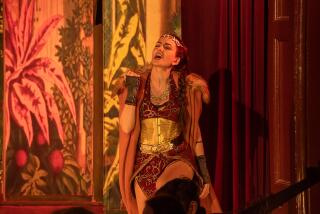TV OPERA REVIEW : GORY BECOMES ‘ELEKTRA’ IN PBS EPIC OFFERING
The Goetz Friedrich-directed, Karl Bohm-conducted “Elektra,” visible tonight on PBS’ “Great Performances” (8 p.m. Channel 24, 9 p.m. Channels 28 and 15), is a gruesome, decadent, gory wonder--a filmed version of the opera that sacrifices “great singing” for a seamless ensemble presentation of the highest order.
Full of epic madness, implied incest and gore galore, this opera is hardly for everyone: Ever since its 1909 premiere in Dresden, “Elektra” has been putting off as many opera-goers as it has turned on. Wisely, Friedrich and Bohm give us a hyper-”Elektra” rather than trying to homogenize the score’s violence and hysteria.
Friedrich provides an admirably clear view of the plot, thanks to flashbacks (Agamemnon’s murder, Orest’s flight, Klytaemnestra’s bad dreams) and frequent whole-stage camera angles, which allow the viewer to keep the ongoing story in mind.
And does he pour on the Expressionism. The sets and decor (designed by Josef Svoboda) blend the swampy, primeval Greek time frame of the plot with a post-industrial, crumbling near-future--the Mycenaean palace resembles a cross between a modern bank building and a bombed-out bunker.
Yet Elektra, when she dances her final wild celebration, stamps her feet in the bloody, scrofulous muck that surrounds and covers the palace’s floors and grounds.
The lighting (by Friedrich) and costumes (by Pet Halmen) contribute to the bloated, puerile atmosphere: Klytaemnestra’s minions are half-naked and bathed in a bloody orange glow, and Aegisth and his retinue blind the eye with their riotous hothouse colors--like frail butterflies that live but a moment. We feel the depravity of these figures in a way a stage production could not hope to match.
As Klytaemnestra, Astrid Varnay resembles a plague victim from outer space, her eyes huge saucers of darkness. Her voice is a wobbly shred of its former Wagnerian greatness, of course, yet this fits Friedrich’s concept perfectly.
But Catarina Ligendza’s Chrysothemis, while looking the part of the naive, frustrated girl-woman, seems wrong, even in this bizarre context. She sounds older than her tormented sister Elektra, and she fares badly in the lyrical passages, often swooping and breaking the musical line.
In a role his light baritone would founder on in the theater, Dietrich Fischer-Dieskau is a commanding Orest, though this edition of the opera employs cuts that rob the role of much of its power.
This “Elektra” is very well served by its title character, though. Leonie Rysanek is utterly convincing as the vengeance-mad woman: her singing, while uneven, soars in the heavy declamatory passages, with B-flats tossed off with hardly a care. Yet her seduction of Chrysothemis is all soft breathiness, and her steely determination in the face of her mother Klytaemnestra is a wonder.
As Rysanek’s introductory remarks make clear, this production was mounted partly as a tribute to conductor Bohm, who was gravely ill during the filming and died soon after its completion. Yet to hear the sweeping passion Bohm brings to the score--and the inspired performance of the peerless Vienna Philharmonic, obviously playing their hearts out for him--denies any infirmity, save that in the score itself.
More to Read
The biggest entertainment stories
Get our big stories about Hollywood, film, television, music, arts, culture and more right in your inbox as soon as they publish.
You may occasionally receive promotional content from the Los Angeles Times.










